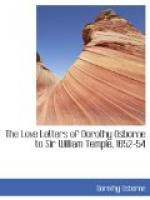“Nor was it only the influence of rivals that Temple had to dread. The relations of his mistress regarded him with personal dislike, and spoke of him as an unprincipled adventurer, without honour or religion, ready to render service to any party for the sake of preferment. This is, indeed, a very distorted view of Temple’s character. Yet a character, even in the most distorted view taken of it by the most angry and prejudiced minds, generally retains something of its outline. No caricaturist ever represented Mr. Pitt as a Falstaff, or Mr. Fox as a skeleton; nor did any libeller ever impute parsimony to Sheridan, or profusion to Marlborough. It must be allowed that the turn of mind which the eulogists of Temple have dignified with the appellation of philosophical indifference, and which, however becoming it may be in an old and experienced statesman, has a somewhat ungraceful appearance in youth, might easily appear shocking to a family who were ready to fight or to suffer martyrdom for their exiled King and their persecuted Church. The poor girl was exceedingly hurt and irritated by these imputations on her lover, defended him warmly behind his back, and addressed to himself some very tender and anxious admonitions, mingled with assurances of her confidence in his honour and virtue. On one occasion she was most highly provoked by the way in which one of her brothers spoke of Temple. ‘We talked ourselves weary,’ she says; ’he renounced me, and I defied him.’
“Near seven years did this arduous wooing continue. We are not accurately informed respecting Temple’s movements during that time. But he seems to have led a rambling life, sometimes on the Continent, sometimes in Ireland, sometimes in London. He made himself master of the French and Spanish languages, and amused himself by writing essays and romances, an employment which at least served the purpose of forming his style. The specimen which Mr. Courtenay has preserved of these early compositions is by no means contemptible: indeed, there is one passage on Like and Dislike, which could have been produced only by a mind habituated carefully to reflect on its own operations, and which reminds us of the best things in Montaigne.
“Temple appears to have kept up a very active correspondence with his mistress. His letters are lost, but hers have been preserved; and many of them appear in these volumes. Mr. Courtenay expresses some doubt whether his readers will think him justified in inserting so large a number of these epistles. We only wish that there were twice as many. Very little indeed of the diplomatic correspondence of that generation is so well worth reading.”




